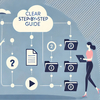
There are certain issues that are very common for technical documentation teams all over the world. We will not only name them in this blog post but will also provide comprehensive solutions. Let’s begin.
You Don’t Have a User Manual
Or, rather, you wouldn’t call what you have a user manual. This is easily the case for many startups. When the bandwidth is not sufficient to cover everything, technical documentation is the first candidate to be sacrificed, sadly.
Let’s face it, in the eyes of the executives, user manuals are not the tool itself. The app will still function perfectly without them. No one will be able to understand how to work with it properly, so what?
Solution:
Write it. Just like that. Technical documentation is no less important than any part of product development. If you are lacking resources, there’s always an option to outsource. Remember that the adoption of your product depends heavily on documentation.
Documentation is Outdated
This is a common problem. Even big players are often caught not updating their help as much as they should. This leaves a bad impression on readers. Documentation feels unreliable. The first thing that catches the eye is the old screenshots with an outdated UI. Your readers will be very frustrated trying to connect the dots comparing the new interface they are working with with the old one in the pictures. Or, worse, they can just rage quit after spotting the outdated screenshots. What’s the point of going through a text that is probably lacking half of new features?
Solution:
Plan maintenance ahead. If you are struggling to find resources for updating everything in one go on a regular basis, learn to prioritize. Go through the metrics to understand which help topics should be updated first and make them a priority.
You can also be proactive in regards to maintenance – add visual elements wisely, there’s no need to overwhelm readers and create a screenshot for everything.
Reuse content. The rule of thumb for modern help authoring is reusing as much content as possible. This makes maintenance so much easier – you just need to change a set of instructions in one help topic, for example, and it will automatically update anywhere else in your documentation! Learn more in this post – Single-Sourcing in ClickHelp.

Nobody Reads it
This problem makes us go deeper. Many factors are at play here. You need a thorough analysis to map out a plan of action.
Solution:
You can try looking at traffic sources first. Organic traffic is good, but, as far as technical documentation is concerned, direct traffic should bring a significant amount of people in. Direct traffic includes links from your website, from the app. A lack of such traffic can mean broken links or the absence of links where they need to be.
The next stop is Bounce Rate. It gives you an idea of how relevant the content is. If you see certain trends like a lot of hits on a help topic but the bounce rate is over the roof or people are completely ignoring topics that actually describe features that are raising a lot of questions in Support – this means that something’s up. It can be anything from poor readability to a malfunctioning search engine.
Using the right help authoring software does wonder for such issues. ClickHelp, for instance, contains dozens of metrics to measure readability of technical texts . You can carry out a serious investigation of readability quite effortlessly.
As far as the search engine is concerned, the ClickHelp team is proud to say that we are using a patented full-text search engine that gives great results!
Conclusion
The solutions we describe here don’t look too easy, that’s true. But, actually, all these things just need to be embedded in the general help writing process once. From this point forward, they will work naturally and smoothly!
Good luck with your technical writing!
ClickHelp Team
Author, host and deliver documentation across platforms and devices



